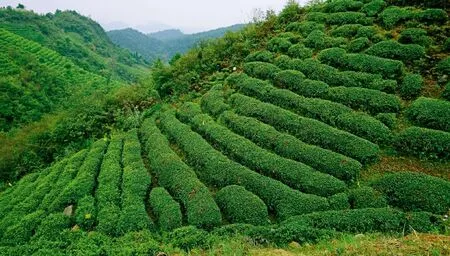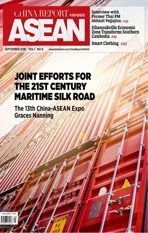Tea Tour of Duyun
2016-11-23ByTanXingyu
By Tan Xingyu
Tea Tour of Duyun
By Tan Xingyu

Duyun Maojian tea is grown organically in high mountains, far away from pollution.
Our bus slowly snaked its way through winding mountain roads,and though the road is smooth and wide, the journey left us feeling dizzy. Thanks to the experienced driver's knowledge of safely traversing the mountains of southern China's Guizhou Province, we arrived safely in Luoshike (Snail Shell), a major tea production base of Duyun.
Tis was the scene that greeted this reporter at Luoshike, which was graced by the 2016 International Conference of Tea Experts on Sept. 22-25. Traditional performers of Bouyei and Miao (two of China's 55 ethnic minorities) ethnic groups were in attendance, dressed in traditional folk costumes complete with jingling silver accessories. A troupe of more than 1,000 performed on a nearby mountain's peak, with bright sound echoing in the mountains. Such a vibrant and iconic atmosphere is unique to southern China.
Duyun is the capital of the Qiannan Bouyei and Miao Autonomous Prefecture in Guizhou. It is located deep in the mountains of the Yunnan-Guizhou Plateau and is 50 percent covered by forest, making it famous for its beautiful natural landscapes.
A Small Town in the Deep Mountains
Duyun is the capital of the Qiannan Bouyei and Miao Autonomous Prefecture in Guizhou. It is located deep in the mountains of the Yunnan-Guizhou Plateau and is 50 percent covered by forest, making it famous for its beautiful natural landscapes. In addition to picturesque scenery, it is an iconic place for some of China's most traditional folk cultures.
Compared to typical Chinese cities,Duyun is considered small or even inconspicuous. However, it carries with ita strong distinctiveness, as it is located on a long and narrow basin between two mountains. Due to limited land for building, skyscrapers of 20 floors or more are commonplace, adding to the city's allure. Moreover, newcomers are usually surprised by the high degree of modern infrastructure found in Duyun,despite its location in one of China's least-developed provinces.
A large number of ethnic minorities call Duyun home, and two-thirds of the city's population is composed of the Bouyei, Miao and Shui ethnicities. Terefore, Duyun's cultural background is another factor to its uniqueness. People in the city have a love for dancing and singing. It is commonplace to find a farmer singing while working.
As a home to song and dance,Duyun attracts visitors with its sweet melodies, special folk costumes and delicious food and drink. Tanks to plentiful nearby forests, natural landscapes in and around the city are stunning, which led to Duyun's official recognition as one of China's top tourist cities in 2001. Fresh air attracts people accustomed to the smog of China's larger cities.
Duyun Maojian Tea
Heavily-forested mountainous areas are typically graced with plentiful and diverse animals and plants. Duyun is no exception, and Maojian tea is one of its specialties.
Because of suitable geographical and climate conditions, high quality green tea has been growing in Duyun for hundreds of years. Maojian tea has a long history of international recognition. It was once awarded a gold medal at the 1915 Panama Pacific International Expo,a feat that local tea-growers are proud of to this day. In 1956, tea growers sent newly harvested tea to Mao Zedong,leader of the newly established People's Republic of China. Mao expressed his thanks in a letter to the growers, suggesting they plant even more on the hillsides.
During recent years, as people's living standards have improved, tea recognized as high quality is growing more and more popular among Chinese people. Because it grows in an area far away from pollution, Duyun Maojian contains a number of micronutrients, including zinc and selenium, which are highly sought-after in the Chinese tea market. The local government hopes to establish Duyun Maojian as a competitive international brand. However, branding efforts need to improve. Local farmers have complained that a lack of brand awareness has limited sales, which led the local government to host the 2016 International Conference of Tea Experts. Tea dealers from Europe and Southeast Asia attended, learning about Duyun Maojian.
Meanwhile, local tea growers are actively developing a new line of products to gain a larger market share. For example, green tea was once considered the only type of tea that could be pro-duced in the area, but today, black tea and various tea-related products are also produced here.

Maojian tea is Duyun's most famous specialty.
“We live on what nature provides. We hope that Duyun Maojian tea, our area's most representative product, can help us shake off poverty and lead a prosperous life,” one local tea grower said.
From Small Town to High-Speed Rail Accessible City
Due to its remote location in China's southwestern mountains, Duyun is unknown to many, even people in China's mainland. An old Chinese idiom originated in the city — “the ludicrous conceit of the King of Yelang — parochial arrogance”.
The idiom comes from a story in which some 2,000 years ago, Emperor Wudi of the Han Dynasty once dispatched an emissary to the State of Dian (modern-day Yunnan Province)and the State of Yelang (modern-day Guizhou Province). Te King of Dian asked the Han emissary, “Which one is larger, the Han Dynasty or the State of Dian?” The King of Yelang asked the same question when the emissary visited his country. In fact, both Dian and Yelang were only as large as a Han Dynasty prefecture, but since both remained closed off from the outside world, they did not understand the rest of the world. Tey had no idea of the vastness of the Han territory.
Such an information block was the result of impeded transportation. Even just a few decades ago, poor traffic conditions meant that locals in Duyun spent two or three days driving to Guiyang,the provincial capital, despite the fact that Guiyang is only 200 kilometers away. With the accelerated development of China's interior provinces, traffic conditions have hugely improved. Nowadays, the drive can be completed in under two hours. Newly constructed high-speed railways have also linked Duyun to China's major cities. People in Guangzhou can make the journey to Duyun in under five hours. Today,during China's major holidays, tourists come from far and wide to enjoy Duyun's beautiful landscapes while chuckling at the story of the ludicrous conceit of the King of Yelang.

Scan this QR Code to watch a video called“Go to Duyun with Me” on YouTube.)
